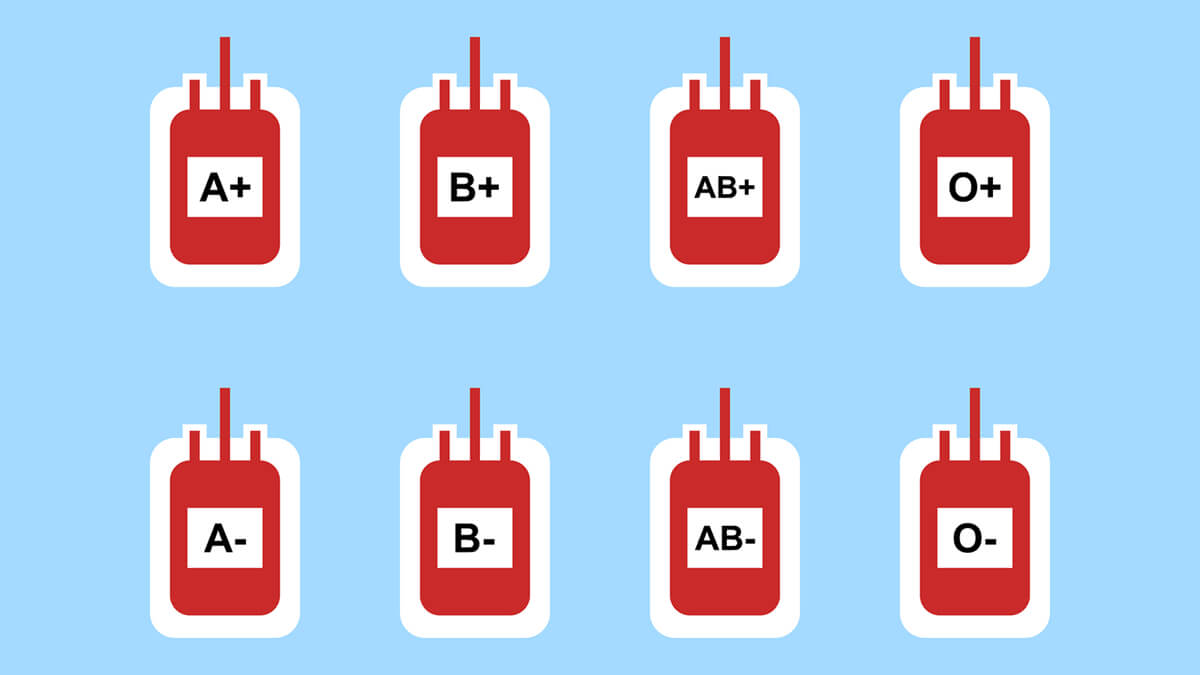What Your Blood Type Says About You
In the United States, some individuals check up on a possible partner's star sign to determine whether their personalities are a match and if they are compatible. According to your own admission, you may have sought guidance from celebrities on matters such as personality type and romantic relationships at some point. Some people, however, do not rely on astrological signs to determine their personality traits, but rather on their biological markers.
Author:Celeste PearlReviewer:Kelly HayesOct 27, 202211 Shares336 Views

According to the most recent scientific research, your blood type does not influence your personality. How might that be possible? You have a personality that is complex, complicated, and utterly unique to you since you have one of just four blood types. In this article, you will read what your blood type says about you.
Although it is unnecessary to speculate on whether particular tendencies or characteristics are associated with specific blood types, it is not harmful to doso.Personality typing may be a fun approach to try to gain a better understanding of yourself, and it can even provide you with vocabulary to use to convey your perceptions of yourself to others.
The History Of Ketsueki-gata
Japanese professor Tokeji Furukawa released a study in the Journal of Social Psychology in 1930 titled "A Study of Temperament and Blood-Groups." The report was the first of its kind. The author of this research argues that finding a relationship between personality and blood type "may serve as a valuable foundation for the objective study of temperament."
He linked this endeavor to the ancient Greek physician Hipporcrates' categorization of temperaments as sanguine, phlegmatic, choleric, and melancholic, which are from the idea known as humorism and are derived from the concept of humorism.In accordance with this view, four body fluids have an impact on one's personality and conduct; nonetheless, Furukawa argued that current temperament classifications often fall into two categories: physiological and psychological temperaments.Blood type personality is a notion that combines the two categories, explaining the psyche through the lens of physiology and genetics.
Furukawa asserted that blood types A, B, O, and AB each had a distinct influence on one's personality.Blood types are distinguished from one another medically because of their antigens, which are chemicals on the surface of red blood cells that stimulate the immune system to produce antibodies against them.Furukawa's interest in blood type, on the other hand, extended far beyond the study of antigens.
Despite the fact that he presented elaborate charts to support his claim that blood type coincides with temperament, his study has been criticized for depending mainly on questionnaires and for failing to provide actual data.Even though Furukawa's findings on blood type personality were published six years ago, other academics were quick to call into question his conclusions. Despite this, the notion of ketsueki-gata did not die out, as seen by the influx of blood personality type books into the market in the 1970s.They worked together to bring the matter back to the forefront of people's minds.
In the year 1984 to 1985, more than 200 periodicals published research on blood type personality, resulting in the concept's long-lasting appeal in nations such as Japan, South Korea, and Taiwan, as well as a tepid level of interest in countries outside Asia. Several media, including the American magazine Newsweek, have looked into the assertions that blood type has anything to do with personality.
"Newsweek magazine reported in 1985 that the Japanese had discovered a new approach to "typecast" people."It's not astrology, and it's not looking at the bumps on people's skulls," says the author.It's a blood typing procedure.Of fact, there is no scientific foundation for typecasting based on blood, but that hasn't prevented many Japanese from employing it in a variety of situations, ranging from love relationships to job applications."
Studies on ketsueki-gata have persisted far into the twenty-first century in countries all over the world, including Australia, Taiwan, and the United States of America.The International Journal of High School Research published a paper by Tanu Bondu, a 12th grader from Tamba Bay, Florida, in 2021 about blood type personality. Tanu Bondu was a student at Tamba Bay Middle School."I conducted statistical research to see whether or not there was a link," she explained."I didn't uncover any evidence of a connection, but I'm hoping to carry on with this research to find out more."
Until now, no comprehensive scientific investigation that included quantitative data was conducted to demonstrate a relationship between blood type and disposition.Nonetheless, believe in ketsueki-gata endures, even in the United States, where writers have found success in arguing that a person's blood type should guide lifestyle aspects such as food and exercise choices.
Isn't it true that blood is blood? Yes and no, to be honest. Human blood is composed of the same fundamental components as other bodily fluids, yet there are differences that allow for the existence of four unique blood types (further distinguished by negative and positive).On the surface of red blood cells, the antigens — or immunological defense mechanisms — that differentiate the four types of blood groups are present in various amounts.
When a Japanese scholar by the name of Tokeji Furukawa released a paper in 1930 saying that the distinct blood types — A, B, AB, and O — represented the characteristics of persons who had them, it made headlines throughout the world.
Since then, the classification of blood types, known as "ketsuekigata," has become deeply ingrained in Japanese society.Blood type horoscopes are offered on Japanese television and newspapers in the same way as astrological horoscopes are, and books that explain the relationship between blood type and personality are perennial bestsellers.There are also matchmakers that specialize in identifying potential couples based on blood type compatibility and compatibility.However, much like astrology, there is no scientific evidence to support a relationship between blood type and personality.
In spite of this, lots of studies has been conducted to demonstrate how blood types might reflect patterns of personal health – and this is intriguing in and of itself.According to popular belief, various blood types may protect us against different diseases; scientists have been investigating the relationship between blood types and disease since the middle of the twentieth century. With that in mind, here's what the scientific community has to say about your blood group.In addition, we've tossed in a little ketsuekigata for good measure.
If You Have Blood Type A
Type A blood has only A antigens on red blood cells and B antibodies in the plasma; hence, if you have type A blood, you can give red blood cells to people with types A and AB blood.
The composition of a person's antigens on red blood cells can influence the amount of a certain hormone that is released into the body.Having a type A blood means you are more likely to have greater amounts of the stress hormone cortisol in your body than someone with type B blood. The presence of type A blood is connected with a variety of health hazards, including a 26 percent greater risk of stomach cancer compared to those who have types O and B blood,5 and a five percent increased risk of heart disease compared to those who have type O.
Aside from that, if you have type A blood, you are at increased risk for a variety of cancers, including some kinds of pancreatic cancer and leukemia, and you are also more susceptible to smallpox infections and severe malaria than those who do not have type A blood. The irony is that persons with type A have also been discovered to be less magnetic to mosquitoes, so there's cause to be happy about that!
According to ketsuekigata, if you have blood type A, you possess a number of admirable characteristics.You are sincere, imaginative, intelligent, restrained, patient, and responsible. You are a good listener (even if you are also stubborn and tense).
If You Have Blood Type B
As a result of having type B blood, you only have the B antigens on your red blood cells and the A antibodies in your plasma; you can give red blood cells to persons who have kinds B and AB blood. Over the course of their lives, those with type B had an 11 percent higher chance of developing heart disease than people with type O.
According to research conducted at Harvard University, women who have AB or B blood have a higher chance of getting ovarian cancer. However, if you have type B blood, there is some good news.Those with type B blood have up to 50,000times the amount of strains of friendly bacteria seen in people with type A or O blood, which implies they are more likely to enjoy a variety of health benefits.
And what about ketsuekigata, do you have any?You should be proud of your drive, your active nature, your ingenuity, and your physical strength. You, on the other hand, are self-centered, reckless, unforgiving, and unstable in your behavior.
If You Have Blood Type AB
The blood of those who have AB blood contains both A and B antigens on the red blood cells, but neither A nor B antibodies in the plasma of the patient. If your blood type is AB positive, you qualify to be a universal plasma donor.People who have type AB blood have a 23 percent higher risk of heart disease than those who have type O blood, according to a recent study.
It is possible that having AB blood would increase the probability that a pregnant mother will get the high blood pressure disease known as pre-eclampsia twofold. According to one study, women with type AB blood had more than three times the risk of developing late-onset preeclampsia as compared to those with type O blood.
One intriguing blood type study published in the journal Neurology discovered that people with type AB blood were 82 percent more likely than those with other blood types to experience cognitive difficulties — specifically in areas such as memory recall, language, and attention — than those with other blood types.
The clotting protein is known as coagulation factor VIII, according to the experts, is the source of the problem. "Because factor VIII levels are strongly associated with blood type, this may be one possible causal relationship between blood type and cognitive impairment," explains research author Mary Cushman in an article published on Yahoo Life. Typing AB blood is associated with being calm and controlled; reasonable and adaptive; critical, indecisive; forgetful, and irresponsible when it comes to ketsuekigata.
If You Have Blood Type O
O blood group members have neither A nor B antigens on their red blood cells, but they do contain both A and B antibodies in their plasma, indicating that they are healthy.Blood types O positive and O negative are the most prevalent; O negative is the universal donor type, which means that people with this blood type may donate red blood cells to anybody who needs them.
It's a mixed bag for folks who have type O blood.Having type O increases your risk of developing ulcers14, as well as the possibility of rupturing your Achilles tendons (believe it or not).You also have an increased chance of contracting cholera.In general, people with type O blood are less likely than those with other blood groups to develop pancreatic cancer and are less likely to die from malaria than those with other blood groups; however, people with type O blood are nearly twice as likely as those with type A blood to attract mosquitoes.
Having type O blood says that you are self-assured, self-determined, resolute, strong-willed, and perceptive; regrettably, you are also self-centered, frigid, unpredictable, and maybe a workaholic. Type O blood is represented by the letter O.
Conclusion
According to the most recent scientific research, your blood type does not influence your personality.How might that be possible?You have a personality that is complex, complicated, and utterly unique to you since you have one of just four blood types.
Although it is unnecessary to speculate on whether particular tendencies or characteristics are associated with specific blood types, it is not harmful to do so.Personality typing may be a fun approach to try to gain a better understanding of yourself, and it can even provide you with vocabulary to use to convey your perceptions of yourself to others.

Celeste Pearl
Author
Celeste Pearl is an accomplished writer and expert in numerology, astrology, and spirituality.
With a Bachelor of Arts in Journalism and over 6 years of writing experience, Celeste brings a wealth of expertise to her articles, making complex topics accessible and engaging for readers.
Her passion for metaphysical sciences is evident in her insightful content, where she explores the depths of these subjects with clarity and depth.
Beyond her professional pursuits, Celeste enjoys delving into spiritual practices and connecting with nature for inspiration.

Kelly Hayes
Reviewer
Kelly Hayes is a seasoned journalist with over 10 years of experience, specializing in news reporting and horoscope analysis. She holds a Bachelor's degree in Journalism from New York University, enhancing her credibility and expertise in the field.
Kelly's writing style is characterized by clarity, depth, and a commitment to delivering credible information. Her published works across various platforms showcase her knack for engaging storytelling and insightful analysis.
Readers trust Kelly's expertise in both current events and astrological interpretations, making her a sought-after authority in journalism.
Apart from her professional activities, Kelly enjoys exploring new cultures, practicing yoga, and engaging in philanthropic activities.
Latest Articles
Popular Articles